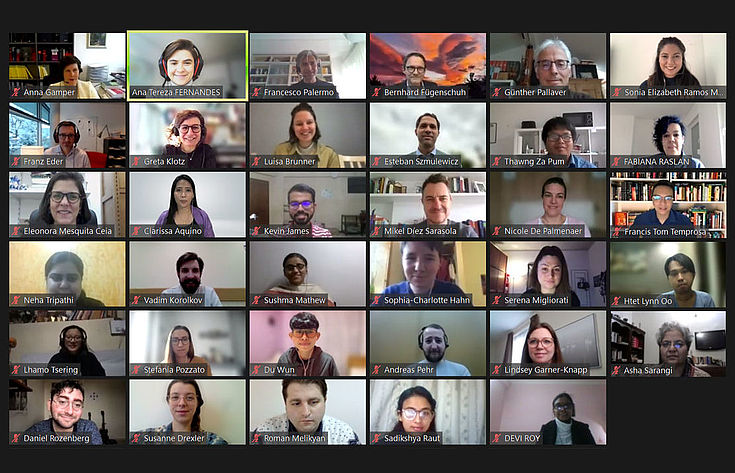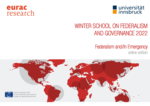Federalism and/in Emergency
PH Representatives join program analysing how multi-level systems act in/respond to exceptional situations
Participants of the online program
EURAC Research
What do federal constitutions say about emergencies? What role does federalism play in times of crises? In “Federalism and/in Emergency,” political scientists and distinguished scholars from various academic disciplines presented incisive comparative analyses of country situations especially from the perspectives of law and political science. Through deliberations and exchanges together with experts and fellow-participants, the representatives from the Philippines gained lessons learned from different approaches and experiences.
The diverse group of thirty participants comprised researchers, PhD and MA students, practitioners, and civil servants. In the series of sessions in this program, they, together with the experts, probed into how multi-level systems act in and respond to emergencies. They dissected constitutional provisions on emergencies and exceptional situations while also considering the constitutional resilience of federal or regional systems.
The roles that national and sub-national executive leaders, parliaments, and courts play during crises and the formal and informal inter-governmental cooperation tools that may be applied to these scenarios were also studied. The analyses and interchanges provided insights into asymmetric territorial responses to emergencies in multi-level systems, the impact of emergencies on sub-national autonomies and the role of sub-national entities in emergency situations. In the broader context, the role of supranational entities in the management crises was also covered.
“Federal system works well in collaboration, and coordination within the key players of government and its constituents.”
Clarissa L. Aquino, Program Manager, Pimentel Institute for Leadership and Governance (PILG)
In the past two years, different countries have experienced different crises, from food insecurity, economic instability, migration and displacement to environmental destruction, amongst others, or some combination thereof. Concurrently, practically all the countries in the world have been affected by the COVID-19 pandemic. Politicians and political scientists alike scrutinise federations, federal states and decentralised governments to determine whether the systems of such governments has been advantageous or disadvantageous to these entities as they assess the governments’ performance in the face of a global health situation compounded by local crises.
In attending the program, the participants from the Philippines sought enlightenment on the strengths and weaknesses of federal entities in prevailing in the face of and in addressing various crises and the pandemic. Upon completion of this program, they join the pool of core group members/experts in the Philippines who can contribute to the even broader dissemination of salient features and principles on federalism, promote public awareness and understanding on the topic and aid in the possible creation of a unique form of federalism that is best suited to the Philippine context.
In review, aside from agreeing that it is not a panacea, experts concurred in their observation that, as a system of government, federalism requires robust inter-governmental relations based on trust and strengthened through continuous consultation and coordination, both horizontally and vertically. This is deemed to enable the system to more readily adapt to a fluid environment especially in situations of crises and of emergencies, as well as adopt best practices. Additionally, political culture and the competence of the people running the system were underlined as critical factors to take into consideration.
The participants from the Philippines took the opportunity to consult and exchange information with experts and fellow participants from more than twenty different countries. Reflecting on the two-week program, Clarissa L. Aquino of the Pimentel Institute for Leadership and Governance (PILG) said, “Federal system works well in collaboration, and coordination within the key players of government and its constituents.”
“… Of particular note to me were the debates around federalism which consider the question of rights and their observance in emergencies. While crises and emergencies are now normalized — with the Covid-19 pandemic plaguing the world and other acute challenges to our climate, peace and security, and collective human rights happening in some part of the world at any time — federalism presents an approach to governance that has perils but may also be promising. …”
Francis Tom Temprosa, Director IV, Human Rights Education and Promotion Office, Commission on Human Rights (Philippines)
Francis Tom Temprosa of the Commission on Human Rights, meanwhile, commented, “… Of particular note to me were the debates around federalism which consider the question of rights and their observance in emergencies. While crises and emergencies are now normalized — with the Covid-19 pandemic plaguing the world and other acute challenges to our climate, peace and security, and collective human rights happening in some part of the world at any time — federalism presents an approach to governance that has perils but may also be promising. …”
The Winter School of Federalism and Governance program is organised by the Eurac Research in South Tyrol, Italy in cooperation with the University of Innsbruck in Innsbruck, Austria. This is the program’s thirteenth run and its second online edition since it first introduced an online edition in 2021.
The participation of three Philippine representatives this 2022 was made possible through the support of the Hanns Seidel Foundation (HSF) in partnership with the Pimentel Institute for Leadership and Governance (PILG) as part of the project “Increasing Awareness of the General Public on Federalism as a System of Government.” In the course of this partnership, there are now a total of ten participants from the Philippines to the two-week program of the EURAC Research Winter School on Federalism and Governance Editions from 2017 to 2020 held in Austria and in Italy and in 2022, online.
Programme


